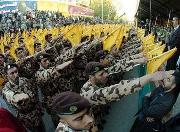WASHINGTON — The FBI and Department of Homeland Security sent a bulletin Friday to state and local law enforcement authorities advising them to watch for potential retaliatory strikes by Hezbollah, one day after the Lebanese militia group vowed to avenge the death of a top commander by attacking Israeli and Jewish targets around the world. “While retaliation in the U.S. homeland is unlikely, Hezbollah has demonstrated a capability to respond outside the Middle East to similar events in the past,” said the intelligence bulletin sent to about 18,000 state and local law enforcement officials late Friday afternoon. The FBI also said it was intensifying its domestic intelligence-gathering efforts to identify any potential Hezbollah threats in the United States in the aftermath of Tuesday’s car-bomb assassination of Imad Mughniyah in Syria. On Wednesday, the FBI sent a confidential internal bulletin to its 101 Joint Terrorism Task Forces across the country warning of the possible domestic consequences of Mughniyah’s killing. As part of that effort, FBI officials at headquarters told the bureau’s field offices and multiagency task forces to increase monitoring and surveillance of suspected Hezbollah operatives and to conduct fresh interviews with sources and informants about the U.S.-designated terrorist group, according to two FBI officials. U.S. authorities have long described Hezbollah as the “A-Team” of terrorism, with far more discipline than Al Qaeda, vast financing from the government of Iran, and a global network of sleeper operatives who could be called on to launch an attack at any time. Various federal investigations and prosecutions have uncovered dozens of Hezbollah fundraisers and supporters in the United States, but few people are believed to be actual “bomb throwers,” according to a senior FBI counter-terrorism official who focuses on Hezbollah.

Though they have no evidence of specific threats in the United States, officials said that precautionary measures were warranted because of Mughniyah’s stature within Hezbollah and because the organization and its Iranian supporters had publicly blamed his death on Israel and “Zionist forces.” Mughniyah, the former Hezbollah security chief and military commander, was one of the world’s most wanted fugitives, accused by the United States and other nations of masterminding attacks that killed hundreds of Americans in Lebanon in the 1980s. Mughniyah also was in charge of international operations for Hezbollah, and in that capacity was believed to have inspired tremendous loyalty from a large number of operatives, fundraisers and supporters in Europe, the United States, Southeast Asia, West Africa and South America. On Thursday, Hezbollah leader Sheik Hassan Nasrallah told thousands of fist-waving mourners in a videotaped eulogy in Beirut that the killing of Mughniyah merited a violent response because it occurred outside the “natural battlefield” of Israel and Lebanon. “You have crossed the borders,” he said, in a reference to Israel and supporters of the Jewish state. “With this murder, its timing, location and method — Zionists, if you want this kind of open war, let the whole world listen: Let this war be open.”

The FBI and Homeland Security did not give local and state law enforcement agencies specific instructions in the bulletin. FBI officials said that was because each local jurisdiction should step up security in ways that it considered appropriate in and around government buildings, Jewish institutions and other potential targets. The senior FBI counter- terrorism official, who spoke on the condition of anonymity because he was not authorized to discuss the bureau’s efforts against Hezbollah, said the bureau was focusing its intelligence-gathering efforts on the Detroit-Dearborn area of Michigan, New York, California and several other U.S. locations with large populations of Lebanese and Muslims. One prominent Lebanese American cautioned against an overreaction. Osama Siblani, president of the Arab American Political Action Committee in Dearborn, said Nasrallah’s threats were directed at Israel, not the United States. Siblani also said that though many Lebanese in the United States supported Hezbollah’s political and social welfare efforts, “they would not tolerate or support any activities of Hezbollah inside the United States. This is our home.” Siblani said: “I think the FBI is expected to do whatever they can to make our country safer. They are trying to do their job. “But if they start rounding up people because they are Lebanese, that is collective punishment, and we will not tolerate it.” In the past, Hezbollah has not launched any attacks in the United States. The two FBI officials and other experts said Friday that they believed that was because the organization had raised so much money here from supporters of its political and social services efforts in Lebanon that it did not want to risk stepped-up enforcement actions. But the calls for retribution by Nasrallah and other prominent supporters of Hezbollah have been unusually strident, if not unprecedented, according to current and former FBI officials who have followed the organization over the years. They are equally concerned, they said, about retaliation from others who merely sympathize with Hezbollah. “My understanding has always been that Hezbollah would never strike in the United States unless they believed that we participated in an operation against them,” said Bob Pertuso, a former FBI special agent assigned to the Detroit Joint Terrorism Task Force from 2000 to 2004 who specialized in Hezbollah investigations. “So if they believed we assisted in the operation against Mughniyah, I would say they would strike in the United States.”






Leave a Reply